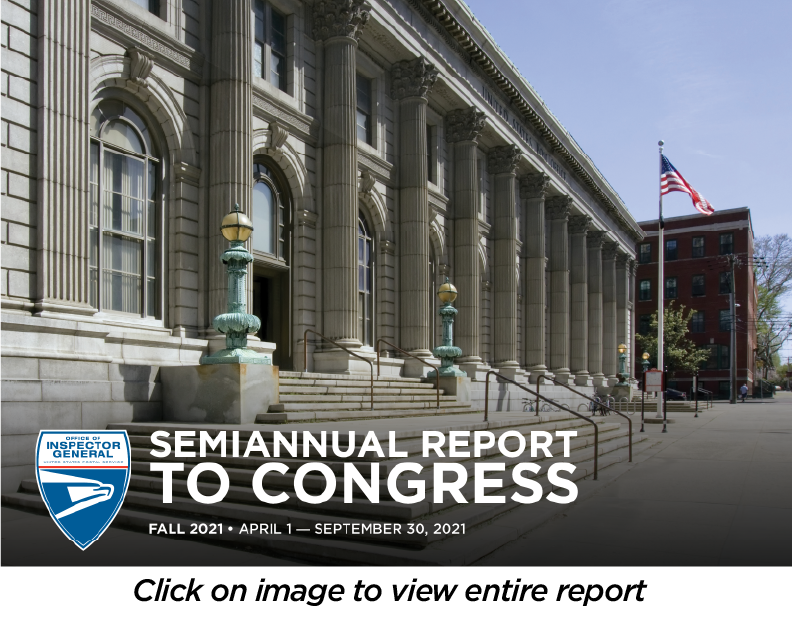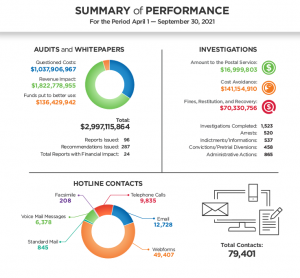The Office of Inspector General is tasked with ensuring efficiency, accountability, and integrity in the U.S. Postal Service. We also have the distinct mission of helping to maintain confidence in the mail and postal system, as well as to improve the Postal Service’s bottom line. We use audits and investigations to help protect the integrity of the Postal Service. Our Semiannual Report to Congress presents a snapshot of the work we did to fulfill our mission for the six-month period ending September 30, 2021. Our dynamic report format provides readers with easy access to facts and information, as well as succinct summaries of the work by area. Links are provided to the full reports featured in this report, as well as to the appendices.
A MESSAGE FROM THE INSPECTOR GENERAL
The end of this fiscal year marks the 25th anniversary of the U.S. Postal Service Office of Inspector General. We started small — with only around 10 employees — but since then have grown to around 1,000 employees stationed in multiple locations across the country. I am very proud of the work our dedicated employees have accomplished over the past 25 years and am confident we will continue to provide high quality products in the years to come.
These past six months have seen many changes for the Postal Service, with many more on the horizon. One of the growing concerns of the mailing community, especially as we move into the peak holiday season, is the ability of the Postal Service to provide timely mail delivery. As a result, a big focus of our work over the past six months has been on service performance. For example, we looked at service performance of single-piece First-Class Mail in 17 districts where Congressional concerns had been raised. We found service was impacted due to a variety of problems, including insufficient operating capacity to handle the increase in parcels and an inadequate number of employees to run the machines.
We also conducted an audit on the service performance of all mail across the country over an 18-month period. Using postal data, we identified the most common root causes behind the service failures. These included insufficient capacity, staffing shortages, routing errors, and mail not being fully sorted when it arrived at the delivery unit. We also issued a primer on Service Standards, to help postal stakeholders better understand how the Postal Service sets, changes, and measures service performance.
Data analytics has improved our ability to identify areas where investigations are needed. For instance, an analysis of sales activity revealed excessive use of “no sale following void” transactions in one location, indicating possible embezzlement. Following this lead, our agents found a postal employee had been stealing cash on several occasions. Data tools also allow us to make better use of customer complaint data, allowing our investigators to analyze allegations more quickly and efficiently. And we use data analysis to identify collusive employees involved with drug trafficking organizations.
This report, submitted pursuant to the Inspector General Act, outlines our work and activities for the six-month period ending September 30, 2021. During this period, we issued 96 audit reports, management advisories, and white papers, and the Postal Service accepted 94 percent of our recommendations. We completed 1,523 investigations that led to 520 arrests and more than $70 million in fines, restitutions and recoveries, $17 million of which was returned to the Postal Service.
Looking forward, we will continue to provide essential oversight of the Postal Service as it moves into peak season and continues to implement operational and structural changes. I am proud of the work our organization has done and will continue to do to fulfill our mission of ensuring the efficiency, accountability, and integrity of the U.S. Postal Service.
Read full report
Source: USPS Office of Inspector General


